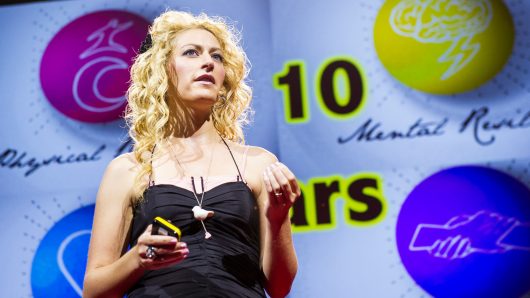Game designer Jane McGonigal firmly believes that video games are not just about mashing buttons and getting to the next level. In fact, during her talk at TEDGlobal 2012, McGonigal gave several surprising statistics: that online gaming can be more effective than pharmaceuticals in treating clinical depression and that just 30 minutes a day is correlated with significant increases in happiness.
McGonigal says online games can even help people heal from injuries and achieve greater wellness in the face of disease. She used an interesting test subject to illustrate this point: herself.
In her talk, McGonigal shared that, following a severe concussion, she found herself bed ridden for three months with a voice in her head telling her that the pain would never end. As she explains, “I thought, ‘I am either going to kill myself, or I’m going to turn this into a game.’”
McGonigal chose the latter route, developing the online game SuperBetter, a series of challenges designed to boost physical, mental, emotional and social resilience. “Within three days of playing the game, that fog of depression and anxiety vanished,” said McGonigal. When she decided to make the game public, she began getting thank yous from across the globe, including from people with cancer and chronic pain.
In her classic TEDTalk “Gaming can make a better world” McGonigal pointed out that online games like World of Warcraft inspire people to think like heroes. But are there other games out there like SuperBetter, which are created for a specific social good? Below, many more examples.
World Without Oil
Also a McGonigal creation, players in this game are dropped into a world where oil resources have been tapped and where they must get creative to survive the massive global shortage. The best part of the game? It teaches easy ways to use less oil in the real world—habits that players report keeping up when they aren’t playing.
FoldIt
An online protein folding game, FoldIt allows its quarter million players to help with scientific research by stabilizing strings of amino acids. Think of it like biological Tetris — FoldIt makes a competition out of biological pattern recognition, leading to innovative solutions to problems that have frustrated scientific communities for years.
WAY
Communicating across languages and cultures isn’t easy. But in this online game, two anonymous players — culled from different locations around the globe — must learn how to speak to each other as they navigate obstacles. Developed by CoCo & Co, this game took top honors at this year’s Games for Change Awards.
Budget Hero
Think you could balance the national budget? Then you’ll want to play this game from American Public Media, which lets players see what happens to the national deficit when they increase funding to programs or opt to make difficult cuts. “Every member of Congress should be required to play this game,” said one of its creators.
Pain Squad
Children and teenagers with cancer are often asked to keep pain diaries — paperwork that is not only boring but focuses their attention on their discomfort. The iOS app Pain Squad makes the whole process fun and interactive — while also helping doctors provide better treatments for young patients.
Spent
When your bank account is in the black, it’s easy to think that anyone could pull themselves out of poverty by their boot straps. But in this online game, players are charged with looking for work while surviving on $1000 a month — highlighting that poverty and unemployment are systematic and not just the result of character flaws.
Evoke
Created by the World Bank Institute in conjunction with McGonigal, this game is a 10-week crash course in social innovation, giving players challenges from “food security” to “urban resilience,” and encouraging them to become a think tank on local challenges.
Unmanned
Most video shoot-em-up video games make war seem action-packed and glamorous. Unmanned aims to paint a far more realistic portrait, casting players as a soldier dealing with boredom and traumatic dreams, in addition to military duties.
Plot.Form
This slick game seeks to make charitable giving fun and interactive, rather than passive and forgettable. Currently fundraising to build homes for teenagers on the street in Moshi, Tanzania, Plot.form allows users to donate—and pick out building materials, colors and more for parts of the homes.

Comments (43)
Pingback: Finding the meaning in video games: Yes, they have value beyond entertainment and self-improvement | Krantenkoppen Tech
Pingback: 7 talks on the benefits of gaming | Krantenkoppen Tech
Pingback: Game Review: SuperBetter « Barbara Z. Johnson
Pingback: Gaming for the Good of the World « April Zhang
Pingback: The Good of Online Games | YesKidzCan!
Pingback: Jane McGonigal: Profile of a Gamer | Two Voices, One Song
Pingback: Games That Teach Social Good | Cool People Care
Pingback: Jogos Online para um Mundo Melhor | PÁGINAS VERDES. ORG
Pingback: Games will save the world | Timbuktu